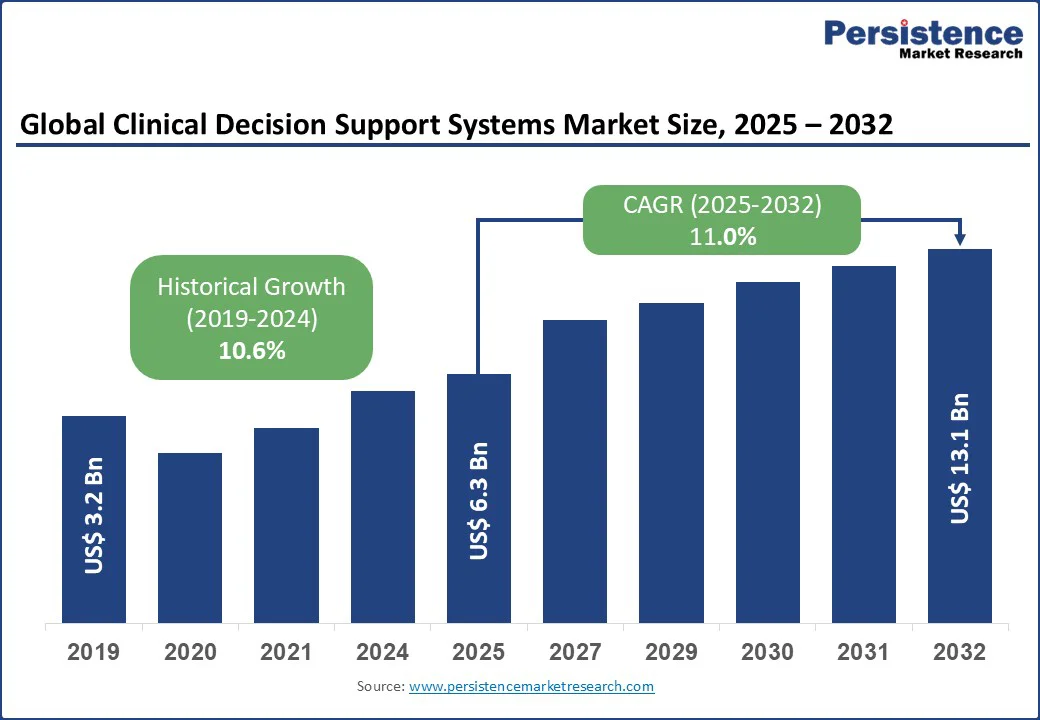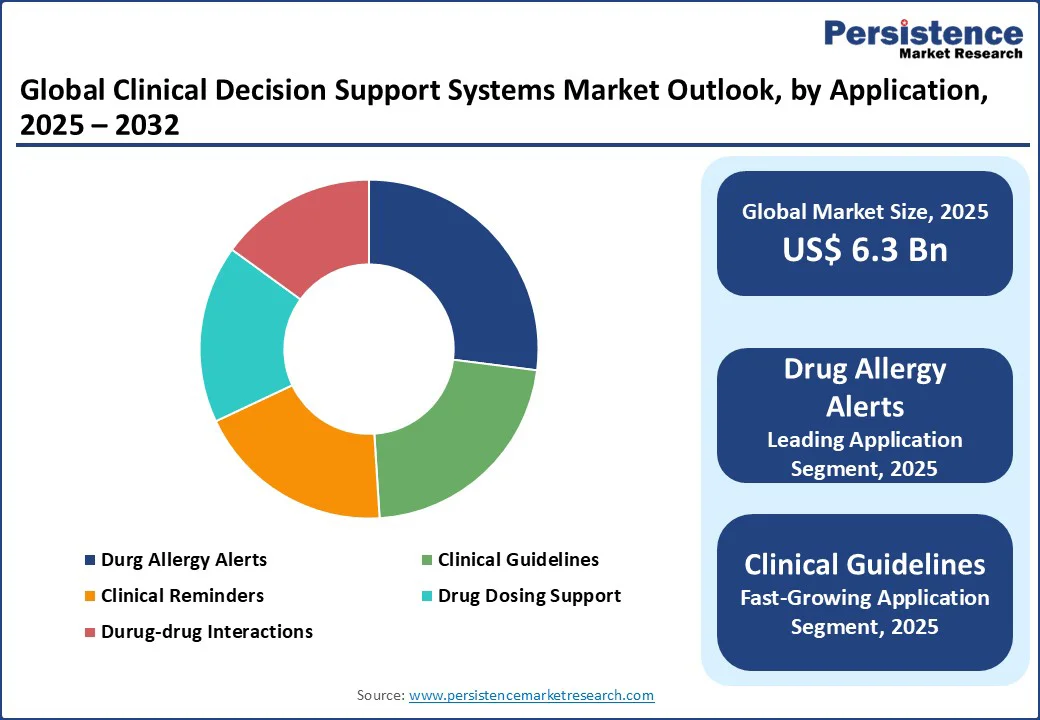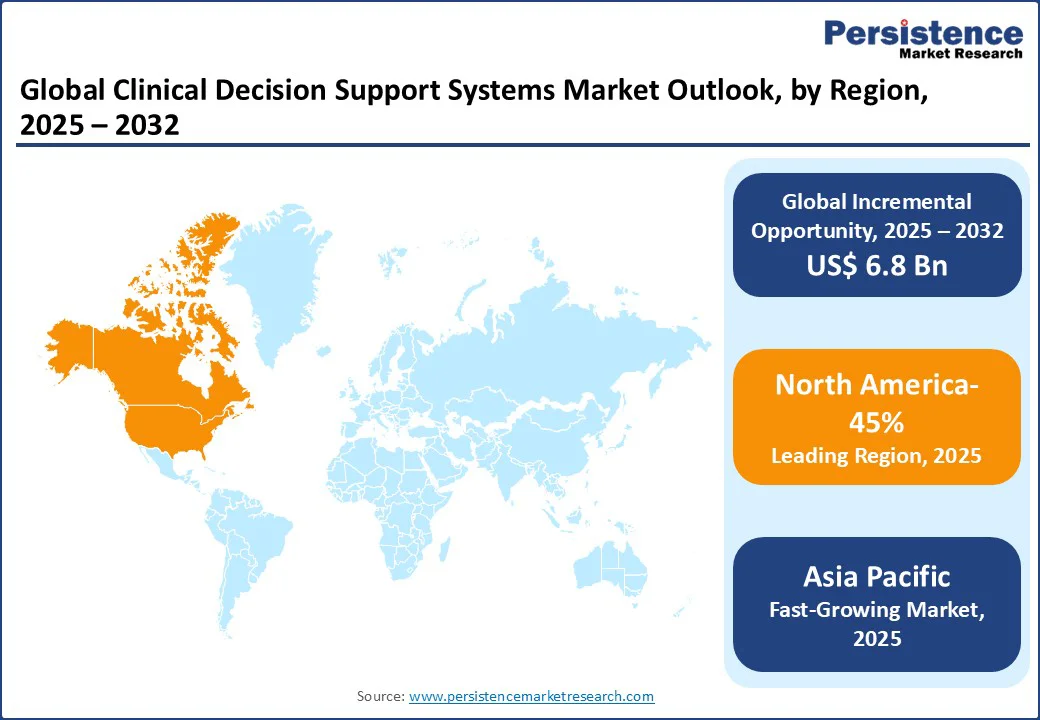ID: PMRREP2811| 191 Pages | 10 Sep 2025 | Format: PDF, Excel, PPT* | Healthcare

The global clinical decision support systems market size is likely to be valued at US$6.3 bn in 2025 and is expected to reach US$13.1 bn by 2032, growing at a CAGR of 11.0% during the forecast period from 2025 to 2032.
Key Industry Highlights:

| Global Market Attribute | Key Insights |
|---|---|
| Clinical Decision Support Systems Market Size (2025E) | US$6.3 Bn |
| Market Value Forecast (2032F) | US$13.1 Bn |
| Projected Growth (CAGR 2025 to 2032) | 11.0% |
| Historical Market Growth (CAGR 2019 to 2024) | 10.6% |
The primary growth driver is the increasing adoption of digital healthcare solutions and AI integration. Rising demand for enhanced patient safety, reduced medical errors, and improved clinical decision-making encourages hospitals and clinics to implement AI-powered decision support systems.
The clinical decision support systems (CDSS) market is experiencing significant growth, driven by the increasing adoption of digital healthcare solutions and Artificial Intelligence (AI). Government-led initiatives, such as the Ayushman Bharat Digital Mission (ABDM) and e-Sanjeevani telemedicine services, are creating a unified digital health ecosystem that improves access to quality care across urban and rural areas.
For instance, the National Health Authority, in collaboration with the Centre for Chronic Disease Control, has implemented an AI-powered CDSS that provides clinicians with evidence-based recommendations for diagnosis and treatment. These platforms enable seamless patient data management, teleconsultations, and integration with hospital systems, laying the foundation for AI-driven clinical support.
By leveraging AI algorithms, such systems enhance diagnostic accuracy, facilitate personalized treatment plans, and optimize hospital resource management. The integration of digital healthcare and AI strengthens clinical decision-making, improves operational efficiency, and enhances patient outcomes, highlighting the transformative potential of technology in India’s healthcare ecosystem
The clinical decision support systems (CDSS) market faces significant restraints due to high implementation costs. Deploying advanced CDSS requires substantial investment in software, hardware, and training of medical staff, which can be prohibitive for smaller hospitals and clinics. Additionally, ongoing maintenance and system upgrades further increase the financial burden, limiting adoption in budget-constrained healthcare settings.
Interoperability challenges also hinder widespread CDSS integration. Many healthcare providers use disparate electronic health record (EHR) systems and legacy software that are often incompatible with modern CDSS platforms. This lack of standardization makes data sharing and seamless integration difficult, reducing the effectiveness of decision support tools. Overcoming these technical barriers is crucial for maximizing the potential of CDSS in improving clinical outcomes.
The clinical decision support systems (CDSS) market presents significant growth opportunities through the rise of precision medicine and expansion into emerging markets. Precision medicine relies on patient-specific data, including genetic, environmental, and lifestyle factors, to tailor personalized treatment plans. CDSS can leverage AI and advanced analytics to process this complex data, helping clinicians make more accurate, individualized treatment decisions and improving patient outcomes.
Simultaneously, emerging markets in the Asia Pacific, Latin America, and the Middle East are witnessing increased healthcare digitization and rising investments in technology-driven solutions. Growing awareness of advanced healthcare tools, supportive government initiatives, and expanding healthcare infrastructure create a favorable environment for CDSS adoption. By targeting these regions, vendors can tap into new revenue streams and establish a strong presence, driving the global growth of CDSS while promoting the adoption of precision medicine practices.
Standalone clinical decision support systems (CDSS) dominate with a 32% market share in 2025, largely due to their cost-effectiveness and ease of deployment in smaller healthcare facilities. These systems allow quick integration, reducing implementation complexities and associated expenses. In 2024, a majority of clinics preferred standalone solutions, benefiting from faster setup and lower maintenance requirements compared to integrated alternatives.
On the other hand, integrated CDSS with electronic health record (EHR) systems is witnessing the fastest adoption in larger hospitals. Its growing popularity is driven by increasing demand for seamless interoperability and real-time access to patient data. In 2024, around 60% of large hospitals implemented integrated EHR-CDSS systems to streamline clinical workflows, enhance decision-making, and support efficient healthcare delivery across multiple departments.
On-premise clinical decision support systems (CDSS) dominate with a 51% market share in 2025, primarily due to their strong preference among large hospitals for data security and control. These systems offer robust protection of sensitive patient information, helping healthcare providers comply with regulations such as HIPAA. In 2024, approximately 70% of U.S. healthcare providers relied on on-premise CDSS to ensure secure data management and maintain control over their IT infrastructure.
Meanwhile, cloud-based CDSS are the fastest-growing segment, driven by enhanced connectivity, cost efficiency, and scalability. The adoption of cloud solutions is rising rapidly as hospitals and clinics leverage remote access, reduced IT maintenance, and faster implementation. Growing awareness of these benefits, coupled with advancements in 5G technology, is accelerating global demand for cloud-based CDSS solutions.
Drug allergy alerts dominate the clinical decision support systems (CDSS) market with a 27% share in 2025, driven by the critical need to improve patient safety. These systems help healthcare providers prevent adverse drug reactions, particularly in high-risk patient groups. In 2024, around 65% of hospitals utilized CDSS for drug allergy alerts, contributing to a significant reduction in medication-related complications and enhancing overall patient care.
Clinical guidelines-based CDSS are the fastest-growing segment, fueled by the increasing adoption of precision medicine. Approximately 45% of healthcare providers use guideline-based CDSS to deliver evidence-based treatment recommendations, especially in oncology and chronic disease management. This trend supports improved treatment accuracy, consistency in clinical decision-making, and better patient outcomes, reflecting the rising importance of data-driven healthcare solutions.

North America leads the clinical decision support systems (CDSS) market with a 45% share in 2025, driven by advanced healthcare infrastructure, high adoption of digital health technologies, and stringent regulatory standards. The region benefits from widespread integration of electronic health records (EHR) and supportive government initiatives that encourage healthcare digitization.
Hospitals and clinics increasingly deploy CDSS to enhance patient safety, improve clinical workflows, and reduce medical errors. Additionally, the presence of major technology providers and ongoing investments in AI-driven healthcare solutions accelerate the adoption of both standalone and integrated CDSS platforms.
Rising awareness of the benefits of personalized medicine, coupled with strong IT capabilities and robust data security practices, further reinforces North America’s dominant position in the global CDSS market.
Europe holds a significant share in the clinical decision support systems (CDSS) market, supported by advanced healthcare infrastructure, high adoption of electronic health records (EHR), and increasing focus on patient safety and quality of care. Government regulations and initiatives promoting healthcare digitization encourage hospitals and clinics to implement CDSS solutions for improved clinical decision-making and workflow efficiency.
The region also benefits from strong investments in AI-driven healthcare technologies, enabling evidence-based treatment recommendations and enhanced patient outcomes. Growing awareness of precision medicine and chronic disease management further drives the adoption of both standalone and integrated CDSS platforms. Combined with robust IT infrastructure and data security measures, these factors position Europe as a key contributor to the global CDSS market.
Asia Pacific is emerging as the fastest-growing market for clinical decision support systems (CDSS), driven by increasing healthcare digitization, rising adoption of electronic health records (EHR), and growing awareness of patient safety solutions. Rapidly expanding healthcare infrastructure in countries such as China, India, and Japan, combined with government initiatives promoting digital health, supports widespread CDSS implementation.
Hospitals and clinics in the region are increasingly leveraging AI-enabled CDSS for improved diagnostics, evidence-based treatment recommendations, and workflow optimization. Additionally, the growing demand for telemedicine and cloud-based healthcare solutions further accelerates adoption. Rising investments in technology-driven healthcare and the need to manage chronic diseases effectively position the Asia Pacific as a key growth market in the global CDSS landscape.

The global clinical decision support systems (CDSS) market is highly characterized by continuous innovation and technology-driven advancements. Companies are focusing on developing AI-enabled, cloud-based, and integrated solutions to enhance interoperability, clinical efficiency, and patient safety.
Strategic initiatives such as partnerships, collaborations, and product enhancements are common to expand market reach and address evolving healthcare needs. This industry also witnesses increased investment in research and development, aiming to provide personalized, evidence-based clinical decision support across diverse healthcare settings globally.
The clinical decision support systems market is projected to reach US$6.3 bn in 2025, driven by healthcare digitization and AI adoption.
Digital healthcare adoption, AI integration, and regulatory mandates for patient safety fuel market growth.
The clinical decision support systems market will grow from US$6.3 bn in 2025 to US$13.1 bn by 2032, with a CAGR of 11.0%.
Precision medicine and emerging market expansion drive opportunities in digital healthcare solutions.
Leading players include McKesson Corporation, Cerner Corporation, Siemens Healthineers GmbH, Allscripts Healthcare, LLC, and IBM Corporation.
| Report Attribute | Details |
|---|---|
| Historical Data/Actuals | 2019 - 2024 |
| Forecast Period | 2025 - 2032 |
| Market Analysis | Value: US$ Bn, Volume: As Applicable |
| Geographical Coverage |
|
| Segmental Coverage |
|
| Competitive Analysis |
|
| Report Highlights |
|
By Product Type
By Delivery Mode
By Application
By Region
Delivery Timelines
For more information on this report and its delivery timelines please get in touch with our sales team.
About Author